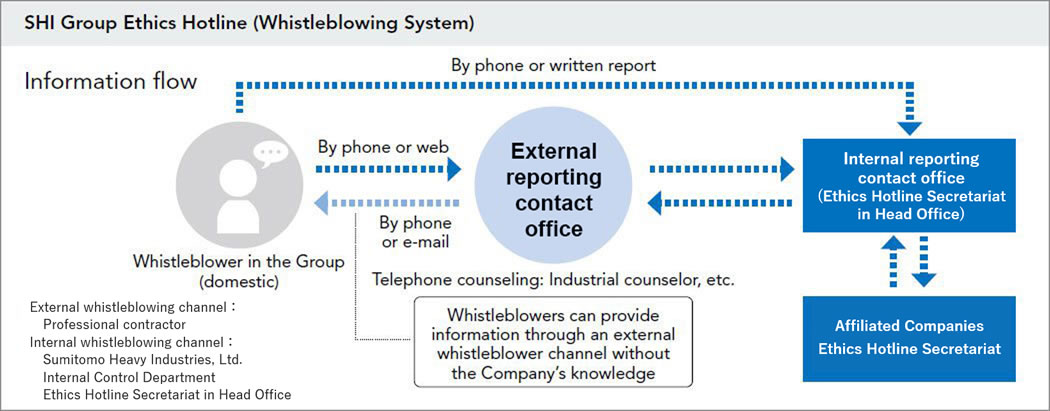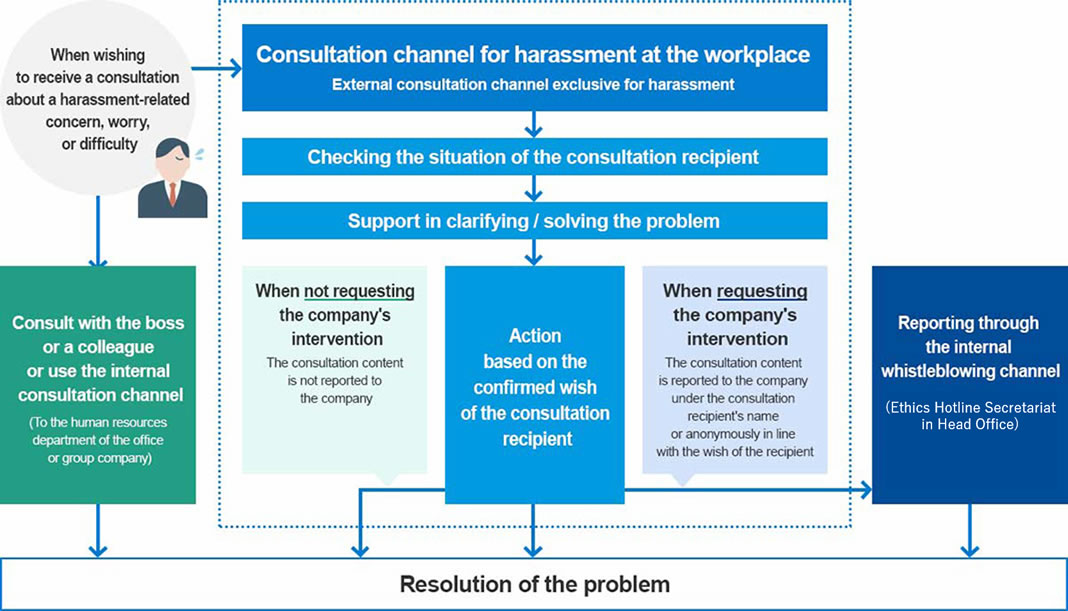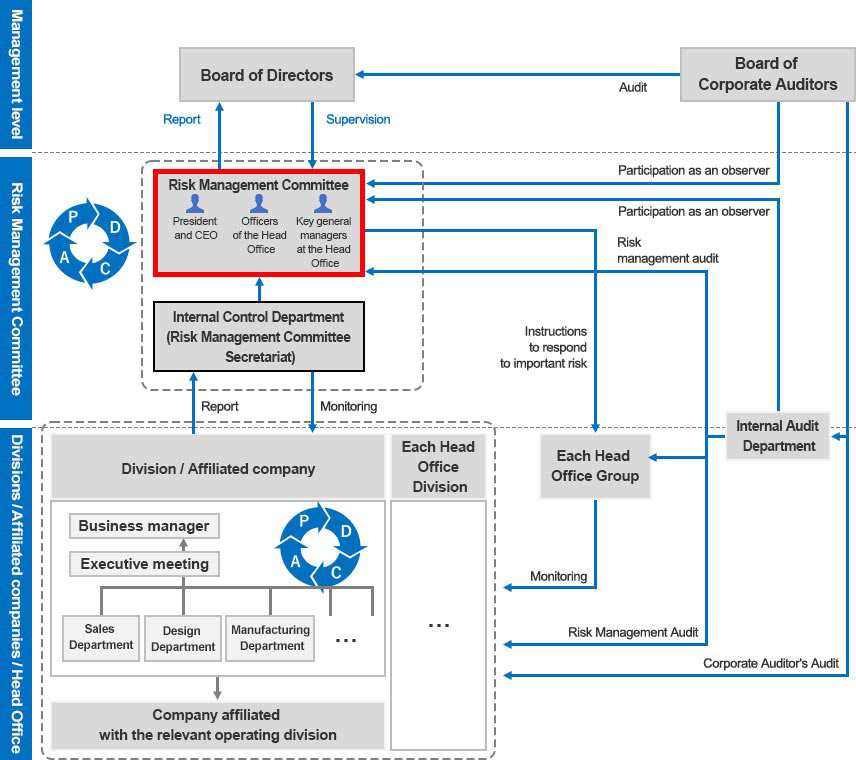Internal Control System
Basic Views
As we, the Sumitomo Heavy Industries Group, have developed an internal control system to secure the appropriateness of operations our group with the aims of increasing corporate value and earning even greater trust from stakeholders.
To ensure appropriate maintenance and operation of this system, a basic policy for the Internal control system was established.
Our group makes progress on its efforts with compliance and risk management regarded as the key pillars of its internal control system.
- Basic policy for the internal control system and its operational status
-
We conduct appropriate verifications at the Board of Directors and provide an overview of the operational status in the business report for the fiscal year.
Promotion System
In order to promote the internal control of the Group, we have established internal control organizations (general internal control promoters and internal control promoters) at the head office, manufacturing plants, branch offices, business divisions and affiliated companies.
Under the president, the Internal Control System Department of headquarters is in charge of this.
In addition, we established a Compliance Committee and a Risk Management Committee, both chaired by the President, to promote compliance and risk management.

Compliance
We require our officers and employees to comply with laws and corporate ethics, and to always act with high decency.
Furthermore, we established a Basic Compliance Policy in March 2020 and thereby strive to ensure comprehensive compliance throughout our group.
- 1Based on Sumitomo's Business Philosophy, we promote compliance in order to achieve sustainable growth and increase corporate value in accordance with its management philosophy.
- 2All officers and employees will comply with laws and internal rules based on the Code of Ethics, practice corporate ethics such as social norms, and carry out business in good faith and fairness.
- 3Safety and compliance shall take precedence over everything else.
Compliance Committee
Roles and Responsibilities
We have the Compliance Committee to raise the trust of the society through compliance-based management practices and to promote compliance activities intended to improve corporate value across our group. This committee deliberates on basic policies concerning compliance, problems arising in relation to compliance, and promotion plans, etc., and reports to the Board of Directors.
Composition
In order to multifacetedly deliberate an ideal style of management given legal and ethical viewpoints and what actions to take in case of the occurrence of any problem contrary to such style of management in broad business areas of our group, the Compliance Committee is chaired by the President, and consists of officers in charge of internal control, officers in charge of legal affairs, officers in charge of technology, and other related executive officers, and standing corporate auditors acting as observers.
Efforts to Promote Compliance
Regulations
- Sumitomo Heavy Industries Ethics Code
- On the basis of Sumitomo's Business Philosophy and Business Principles, we establish the Sumitomo Heavy Industries Ethics Code as the basic behaviors and norms that officers and employees of our group should follow.
We encourage our employees to ensure compliance by promoting the Ethics Code at each compliance education.
- 1Respect for human beings
We respect the personality and human rights of every person. - 2Compliance with laws and regulations
We comply with the laws and internal and external rules and regulations having the respect for their spirits. - 3Fair competition and trade
We engage in business activities based on fair and free competition, and do not pursue profits by unfair means or opaque practices. - 4Severance of relationships with anti-social forces
We take an uncompromising stance toward any group or individual that poses a threat to the order or safety of civil society, and do not engage in any relationship with them. - 5Environmental conservation
We strive to conserve the global environment by promoting resource and energy conservation, waste reduction and recycling as well as prevention of environmental pollution. - 6Respect for fair international business and different cultures
In international business, we respect local culture and customs as well as comply with international rules and laws of each country.
Compliance Tools
- Ethics Cards
- We distribute "Ethics Cards" that describe Sumitomo's Business Philosophy, Business Principles, Ethics Code, and Ethics hotline reporting contact office to officers and employees of our group to ensure thorough compliance.
- Compliance Manual
- This manual summarizes specific action guidelines, such as various rules that officers and employees of our group are expected to observe.
Education
- Level-Specific Education
- For the purpose of deepening the knowledge about compliance required for each level, we provide education for new employees, newly appointed chiefs, section chiefs, executives and officers of our group.
- Workplace-Specific Education
- In order to deepen the basic understanding of compliance, we continuously conduct compliance education and reading sessions of compliance manuals at each workplace.
In addition, employees at each workplace are divided into small groups to discuss and make presentations about compliance-related case studies. Such case-based compliance education method enables employees to gain an understanding of compliance in a convincing manner.
- E-Learning
- In addition to compliance, we include safety, harassment, and Sustainability as the subject matters of education and conduct across-the-board confirmation tests for all our group’s employees.
We have also extended e-learning to overseas affiliated companies, and has started to provide it on a periodical basis at all Chinese affiliates and major Southeast Asian affiliates in 2016 and 2018, respectively.
- Function-Specific Education
- We provide education for newly assigned employees to the sales division to better understand the compliance risks that sales reps may encounter, contract foundations, and sustainability.
Survey / Request for Submission of a Pledge
- Compliance Awareness Survey
- We conduct a compliance awareness survey annually to ascertain the compliance understanding levels of our group’s employees and the presence of any potential risks and other problems at the workplace, and the targets of this survey include employees of affiliated companies in Japan and China.
We take measures to improve compliance with a focus on trends in survey results not only from the current fiscal year but also from past years, as well.
- Submission of Pledges of Compliance
- To ensure the execution of business activities with awareness of compliance, we require each manager of our group and each director of subsidiaries to submit a pledge of compliance.
Anti-Bribery
In recent years, as our business has further expanded globally, we have been working to strengthen our international anti-bribery system as an important issue for our group.
We formulated “SHI Group Anti Bribery Basic Policy” in July 2021, with the aim of preventing bribery by clearly stating matters such as our basic stance toward bribery and the rules to be followed by officers and employees of our group. This policy applies to all officers and employees of our group.
To prevent bribery, we will continue to promote the dissemination of this policy and activities based on the characteristics and risks of each business, country and region.
Compliance with the Competition Laws
In recent years, as our business has further expanded globally, we have been working to strengthen our international compliance system with the competition laws as an important issue for our group.
We formulated “SHI Group Basic Policy on Compliance with the Competition Laws“ in January 2025, with the aim of preventing violations of the competition laws by clearly stating matters such as our basic stance toward violations of the competition laws and the rules to be followed by officers and employees of our group. This policy applies to all officers and employees of our group.
To prevent violations of the competition laws, we will continue to promote the dissemination of this policy and activities based on the characteristics and risks of each business, country and region.
Establishment of Whistleblowing and Consultation Channels
Ethics Hotline
We have a whistleblowing system called "SHI Group Ethics Hotline" that allows officers, employees and former employees (within 1 year of resignation) of our group to report to or consult with the Compliance Committee Secretariat with regard to facts that violate or may violate laws or internal rules.
The Ethics Hotline is based on "SHI Group Ethics Hotline Regulations" (revised June 1, 2022) in compliance with the Whistleblower Protection Act. This hotline accepts anonymous reports and protects whistleblowers by prohibiting retaliation or other disadvantageous treatment.
In 2017, a common hotline for all our group’s employees (internal and external hotline) was established in Japan, making it easier for employees to report and consult.
In 2019, we also established a common external hotline in China for employees of major affiliated companies in the country.

Workplace harassment reporting contact office
Aside from the ethics hotline that mainly serves as the whistleblowing channel for general matters related to compliance, an external consultation channel exclusive for workplace harassment was set up in 2020.
This is a channel for consultation that is aimed at maintaining a sound workplace environment and allows employees to anonymously receive consultations on harassment-related concerns or even less serious matters such as small worries about personal relationships at the workplace.
When an employee uses the workplace harassment consultation channel, support is provided to the employee in clarifying/solving the problem in line with the employee's wish.
When receiving a consultation, the protection of privacy of the receiving employee is guaranteed. Additionally, no employee is to be subjected to detrimental treatment for receiving any consultation.

Risk Management
Basic Views
The importance of risk management, including the management of ESG-related risks, is rising year by year with the expansion of our business scale, the acceleration of globalization, and the increasingly complex nature of social and environmental issues. Based on this recognition, we are actively working to strengthen our risk management system and upgrade our risk management processes in order to make optimal management decisions and achieve sustainable growth across our group.
- 1Reduction of Opportunity Loses
With respect to taking risks that may affect the achievement of business targets, we strive to make appropriate decisions to reduce opportunity losses.
- 2Reduction in the Occurrence of Risks
We prevent the occurrence of risks that may disturb the achievement of business targets and, if any such risk comes to the surface, take swift and appropriate action to keep damage to a minimum.
Risk Management Committee
Roles and Responsibilities
We have a Risk Management Committee to drive forward across-the-board, comprehensive risk management by identifying potential risks that may occur, or that we may face, in executing the business operations of our group, and by properly controlling risks that may cause a significant impact.
This committee formulates risk management policies, designates important risks, deliberates on matters concerning responses to such risks, and reports to the Board of Directors.
Composition
In order to deliberate on risks to our group, which has wide-ranging business areas, in a comprehensive manner, including from the aspects of business operation, technology, and business management, the committee is chaired by the President and consists of relevant executive officers, etc., such as the officer in charge of internal control, the officer in charge of financial affairs, and the officer in charge of technology, and standing corporate auditors serving as observers.
Risk Management System
With the Risk Management Committee established under the governance of the Board of Directors, we promote across-the-board, comprehensive risk management for our group.
The Risk Management Committee, which meets four times a year, is chaired by the President and consists of the executive officers in charge of internal control, finance, and technology, as well as the general managers and managers of divisions under the control of the head office. The Committee identifies, analyzes, and evaluates risks from a company-wide perspective, formulates measures to address such risks, and monitors the status of risk management in each department. The progress and monitoring results of these activities are reported to the Board of Directors twice a year by the Internal Control Division. In addition, corporate auditors audit the status of risk oversight by the Board of Directors from an independent standpoint.

Risk Assessment
We have established a Risk Management Committee to identify various risks surrounding the management of our group.
The “Risk Assessment Subcommittee” established under the Risk Management Committee assesses the identified risks and classifies them into two major categories: "business risks" that may arise in the course of business execution and "operational risks" that may arise in the course of daily operations in each department.
These risks are further broken down into medium and small categories. Of the 69 small category risks, we have positioned those that are particularly important to address as the “Group' s material risks" and are promoting and following up on measures to mitigate these risks. We review the Group's material risks each fiscal year based on the Group's definition of material risks.
Group’s material risks for FY2025: Economic security risk, Quality fraud/Legal or regulatory noncompliance risks, Information security risk, Risk of noncompliance with the Antimonopoly Act, Climate risk (risks involved in the transition to a decarbonized economy), Human rights risk.
| Catergory | Subcatergory | |
|---|---|---|
| Business risks | Management-level risks | Group governance, Responding to medium- to long-term management issues (Delays in addressing climate change and next-generation research and development), Information disclosure |
| Business-level risks | External environment, Sales and services, Research, development and design, Production procurement, and logistics, Quality, Information systems, Human resources, Management of large projects, BCP | |
| Operational risks | Work environment, Competition and trading, Finance and accounting, Business operations, Facilities and properties, Environmental management, Community and social relations, Internal reporting | |
